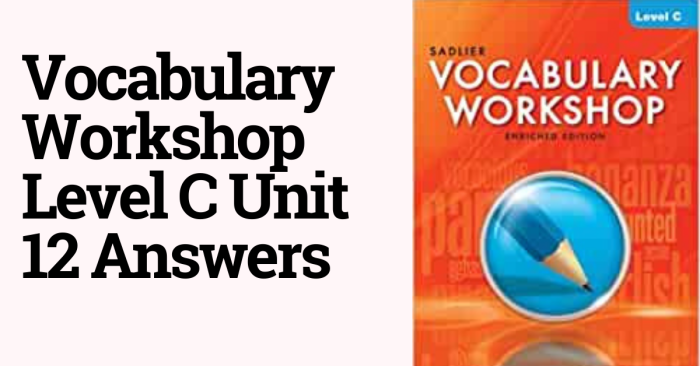Vocabulary workshop unit 6 answers level e – Vocabulary Workshop Unit 6 Answers: Level E provides a comprehensive overview of vocabulary development strategies, word analysis, and vocabulary application. This unit is designed to help students expand their vocabulary, understand word meanings and usage, and develop critical thinking skills.
Through a variety of exercises and activities, students will learn to identify different types of word relationships, such as synonyms, antonyms, homophones, and homographs. They will also learn how to apply their vocabulary knowledge in real-life situations.
Vocabulary Development: Vocabulary Workshop Unit 6 Answers Level E

The vocabulary development strategies covered in this unit provide a comprehensive approach to expanding students’ vocabularies. By incorporating explicit instruction, engaging activities, and authentic materials, the unit helps students develop a deep understanding of new words and their usage.
Expanding vocabulary is essential for effective communication, academic success, and personal growth. It allows individuals to express themselves more precisely, comprehend complex texts, and engage in meaningful conversations.
The unit’s exercises and activities are designed to foster vocabulary growth through various approaches, including word mapping, vocabulary games, and collaborative projects. These activities provide students with multiple opportunities to encounter new words in context and reinforce their understanding.
Word Analysis and Context, Vocabulary workshop unit 6 answers level e
The unit employs a range of techniques to help students understand word meanings and usage. These techniques include:
- Contextual analysis: Examining words within sentences and paragraphs to infer their meaning.
- Morphological analysis: Breaking down words into their root words, prefixes, and suffixes to understand their structure and etymology.
- Semantic mapping: Creating visual representations of word relationships and meanings.
By engaging in these activities, students develop critical thinking skills and a deeper understanding of the nuances of language.
Word Relationships
The unit introduces students to different types of word relationships, including:
- Synonyms: Words with similar meanings.
- Antonyms: Words with opposite meanings.
- Homophones: Words that sound the same but have different meanings.
- Homographs: Words that are spelled the same but have different meanings.
Understanding these relationships helps students expand their vocabularies and use language more effectively. The unit’s activities provide opportunities for students to practice identifying and using these relationships in context.
Vocabulary Application
The unit emphasizes the practical application of vocabulary in real-life situations. Students are encouraged to use new words in their writing, speaking, and listening activities. The unit provides opportunities for students to engage in discussions, role-plays, and presentations that require them to use new vocabulary appropriately.
By applying vocabulary in various contexts, students develop confidence in using new words and improve their overall language proficiency.
Vocabulary Practice and Assessment
The unit includes a variety of vocabulary practice exercises, such as:
- Multiple-choice questions.
- Fill-in-the-blank exercises.
- Word sorts.
- Vocabulary journals.
These exercises reinforce vocabulary learning and provide students with opportunities to demonstrate their understanding. The unit also includes formative and summative assessments to measure students’ vocabulary growth and application skills.
Technology Integration
The unit incorporates technology tools and resources to support vocabulary learning. These tools include:
- Online dictionaries and thesauruses.
- Vocabulary-building apps.
- Interactive games and simulations.
Technology enhances vocabulary learning by providing students with access to vast databases of words, engaging activities, and personalized learning experiences.
Differentiation and Inclusivity
The unit addresses the diverse learning needs of students by providing:
- Tiered vocabulary lists to accommodate different reading levels.
- Multiple modalities for learning, including visual, auditory, and kinesthetic activities.
- Flexible grouping strategies to support collaborative learning.
By promoting inclusivity, the unit ensures that all students have equal opportunities to succeed and develop their vocabulary skills.
Teacher Support and Professional Development
The unit provides guidance for teachers on implementing the vocabulary workshop effectively. It includes:
- Detailed lesson plans.
- Teaching tips and strategies.
- Resources for professional development.
By supporting teachers, the unit ensures that they have the knowledge and skills necessary to facilitate effective vocabulary instruction.
User Queries
What is the purpose of Vocabulary Workshop Unit 6?
Vocabulary Workshop Unit 6 is designed to help students expand their vocabulary, understand word meanings and usage, and develop critical thinking skills.
What types of activities are included in Vocabulary Workshop Unit 6?
Vocabulary Workshop Unit 6 includes a variety of exercises and activities, such as word games, puzzles, and writing exercises.
How can I use Vocabulary Workshop Unit 6 in my classroom?
Vocabulary Workshop Unit 6 can be used as a supplement to your regular vocabulary instruction. It can also be used as a stand-alone unit for students who need extra help with vocabulary development.
